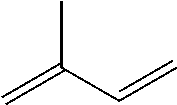Hydrocarbon Polymer Modifiers for Elastomeric Compositions
a technology of elastomeric compositions and hydrocarbon polymers, which is applied in the direction of transportation and packaging, special tyres, tyre parts, etc., can solve the problems of affecting the performance of tyres, and changing the characteristics of rubber compounds over their life, and achieves the effect of lowering the mooney viscosity
- Summary
- Abstract
- Description
- Claims
- Application Information
AI Technical Summary
Benefits of technology
Problems solved by technology
Method used
Image
Examples
example 1
[0150]The ability of the hydrocarbon polymer modifiers to cure into the rubber matrix was investigated by comparing extractables and delta torque measurements for cured rubber formulations against control rubber formulations without processing aids and with other oils and resins as controls. Natural rubber was used. The rubber was compounded using a Brabender with cam blades. The non-productive mix cycle was as follows: 1) mixer rotor speed was set at 50 RPM, temperature set to 90° C.; 2) add elastomers, oils or hydrocarbon polymer modifiers, and free powders; and 3) mix for 8 minutes then remove the batch from the mixer, drop temperature varied from 95 to 105° C. The productive or second stage was added to the mixer with the vulcanization system ingredients. The rotor speed was 35 RPM with the temperature set at 90° C. The compound was mixed to for 4 minutes with a drop temperature around 95° C. The compound was cold pressed and then molded. The cured rubber compositions were then ...
example 2
[0152]The methodology of Example 1 was repeated using SBR JSR 0202. The formulations and results based on the SBR are presented in Table 6.
TABLE 6SBR Formulations and PropertiesRubber Formulation (phr)CompoundSBR1SBR2SBR3SBR4SBR5SBR6SBR7SBR8HS-SBR94.7966.3566.3566.3566.3566.3566.3566.35Aromatic oil028.44000000R23360028.4400000373N00028.440000HPM4000028.44000HPM50000028.4400HPM600000028.440HPM7000000028.44ZnO0.470.470.470.470.470.470.470.476PPD0.950.950.950.950.950.950.950.95CBS1.521.521.521.521.521.521.521.52Sulfur1.331.331.331.331.331.331.331.33DPG0.950.950.950.950.950.950.950.95Toluene Extraction (wt % extracted)2 Hours6.632.532.134.917.827.323.725.84 Hours7.436.436.436.128.929.026.729.36 Hours7.737.337.136.229.129.327.129.2MDR Delta Torque (dNm (in-lbs))MH-ML10.59.637.526.75.785.455.525.27(9.32)(8.52)(6.66)(5.93)(5.12)(4.82)(4.89)(4.66)
[0153]Lower extractables compared to the controls, as well as lower delta torque readings, indicated that the HPM materials were also crosslinked ...
PUM
| Property | Measurement | Unit |
|---|---|---|
| Temperature | aaaaa | aaaaa |
| Temperature | aaaaa | aaaaa |
| Force | aaaaa | aaaaa |
Abstract
Description
Claims
Application Information
 Login to View More
Login to View More - R&D
- Intellectual Property
- Life Sciences
- Materials
- Tech Scout
- Unparalleled Data Quality
- Higher Quality Content
- 60% Fewer Hallucinations
Browse by: Latest US Patents, China's latest patents, Technical Efficacy Thesaurus, Application Domain, Technology Topic, Popular Technical Reports.
© 2025 PatSnap. All rights reserved.Legal|Privacy policy|Modern Slavery Act Transparency Statement|Sitemap|About US| Contact US: help@patsnap.com



